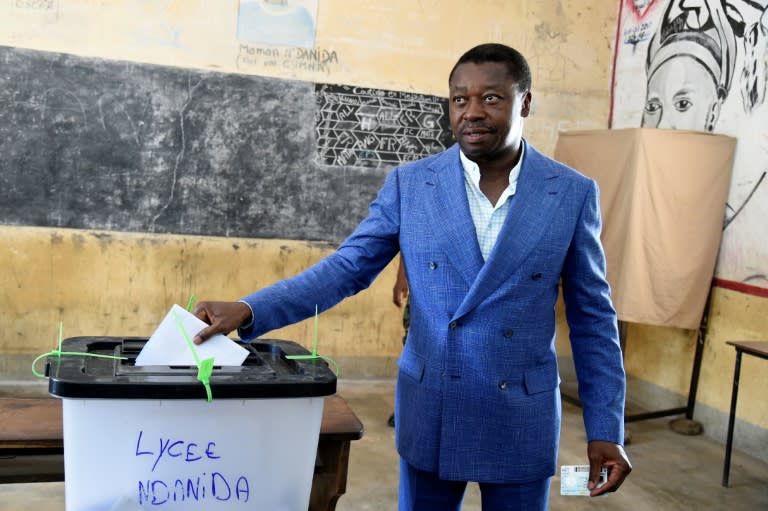Togo opposition calls for protests over election delay

- Oops!Something went wrong.Please try again later.
Togo's opposition on Thursday called for a three-day mass protest to demonstrate against the government's decision to delay this month's legislative elections.
Tensions between President Faure Gnassingbe's government and the opposition have heightened following parliament's approval of a contested constitutional reform critics say is a bid to keep Togo's leader in power.
The presidency announced Wednesday that more consultations were needed over the reforms and suspended the April 20 legislative and regional elections without giving a new date.
Four opposition parties and a civil society group issued a statement calling for protests on April 11, 12 and 13.
"The signatories vigorously condemn the regime's manoeuvre, which attempts by all means to endorse its own constitutional coup," the opposition statement said.
The reform dispute has fuelled debate over the rule of Gnassingbe, who has been in power since 2005 after succeeding his father, who governed for three decades after a military coup.
Fearing an attempt to keep Gnassingbe in power, opposition leaders say they want the government to withdraw the reform, which allows the National Assembly to elect the president directly.
Nine members of the opposition group Dynamique Monseigneur Kpodzro were detained by police in Lome after campaigning in a market about the illegality of the reform, party spokesman Thomas Kokou N'soukpoe said.
Public prosecutor Talaka Mawama said an investigation had been launched against "individuals caught distributing leaflets and chanting slogans inciting popular revolt" on Wednesday.
After a week of political tensions, Gnassingbe had already sent the law back to parliament for a second reading.
"The Togolese are angry and they want this constitutional bill to be withdrawn altogether. Otherwise they are creating disorder," said Nathaniel Olympio, head of the opposition Party of the Togolese.
"This time, this constitutional coup will not pass... This time the Togolese people will stand up and say 'no'."
- No mandate -
West Africa is struggling with fallout from a series of military coups, while Senegal last month generated hope for the region by electing a youthful newcomer to the presidency.
Togo's parliamentary elections had been delayed before, with the opposition claiming the assembly, dominated by Gnassingbe's ruling UNIR party, had lost its mandate because of the lack of a vote.
The constitutional reform has already sparked tensions, with police breaking up a recent opposition press conference and a group of influential figures calling for protests.
Togo's civil service minister Gilbert Bawara told a radio station Thursday that consultations were needed before the vote to ensure transparency about the reforms.
"I believe that it is logical and out of respect for the candidates, out of respect for the Togolese people, out of respect for the voters, that they know the rules of the game before going to the competition," he said.
Togo's parliament in March adopted the law that would introduce a switch from a presidential to a parliamentary system, handing the assembly the power to elect the president for a single six-year term.
Assembly members would elect the president "without debate", according to the new constitution. But it was not clear whether the president could run for another term.
The law also creates the post of "president of the council of ministers" as a type of designated prime minister, who will have power over the government. The post is also elected by lawmakers.
In 2019, members of parliament revised the constitution to limit presidential terms to two, but it did not apply retrospectively, allowing Gnassingbe to stand for the next two elections.
str/pma/lcm/tw

